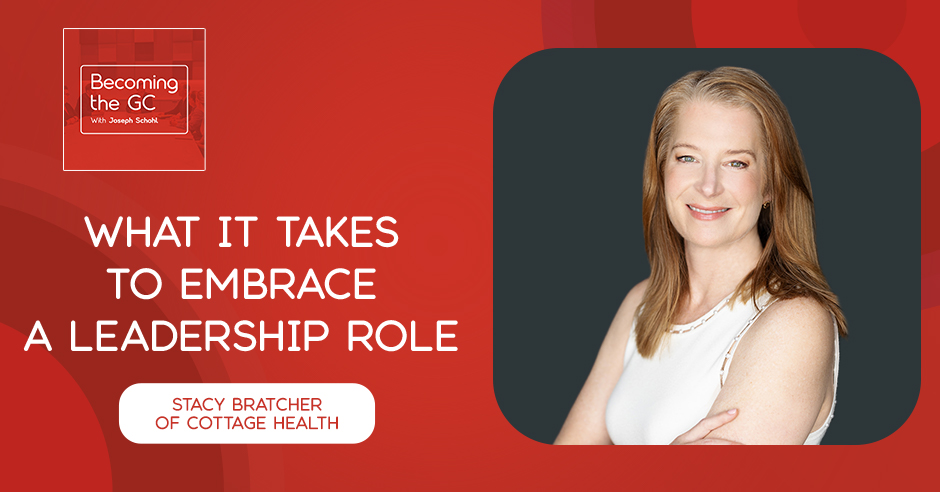
Embracing any leadership role requires not only the necessary skills or knowledge. It is also about taking initiative, building relationships, and driving actual results. Joseph Schohl welcomes Stacy Bratcher, Senior Vice President and Chief Legal Officer at Cottage Health, to discuss her journey from private practice to leading a legal team of a billion-dollar health system. She shares how she navigated career transitions, handled challenges with leading, and built a reputation for getting things done. Stacy also reveals the key habits that set her apart from other general counsels, including her approach to time management, decision-making, and team development. If you want to sharpen your leadership skills in the legal world, this conversation is packed with valuable insights.
—
Listen to the podcast here
What It Takes To Embrace A Leadership Role With Stacy Bratcher
We spoke with Stacy Bratcher. She is someone I am so grateful to have gotten to know. She is someone who gets things done. You’ll read some of her techniques for this episode, where we got tactical and practical. Stay with me to the end, where I’ll share my key takeaways from the episode. This show is sponsored by Inside Counsel Academy, where in-house counsel go to elevate their careers while enhancing their lives. Also, by General Counsel West, a law firm that supports GCs of healthcare companies and their teams with an inside counsel mindset. Without further ado, I bring you Stacy Bratcher.
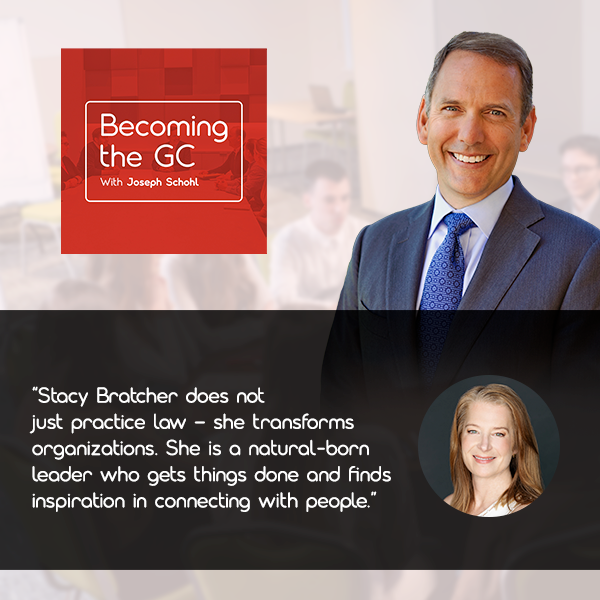
Our guest is Stacy Bratcher. Stacy is the Senior Vice President and Chief Legal Officer of Cottage Health, a $1 billion health system in Santa Barbara, and a trustee of an $800 million workers’ compensation insolvency fund for major employers in California, including Fortune 50 companies. She is the creator and host of The Legal Department, a professional development show for lawyers, which I love and inspired me to start this show. Stacy, welcome to the show.
Joe, how are you?
I’m good. We have a lot to talk about. I’m impressed by all you’ve done. I want to get to the heart of what’s contributed to your success as an in-house lawyer.
I look forward to learning that, too.
Journey From Private Practice To In-House Leadership
First, a little bit about your journey. As many GCs, you started in private practice and made your transition to an in-house role. Tell me about your evolution as an in-house lawyer.
I’ve written about this in the past that as a young lawyer, I had no idea about in-house practice, what was involved, and there were different stair steps to the career. When I took the job at USC, I was excited to be part of a mission-driven organization. I was going back to my roots in state government where I was engaged and passionate about the work.
That’s what I was looking for in in-house roles. I hate to say lucky, but I landed at a good place with a very supportive boss who gave me opportunities or if there were opportunities, let me step into those. I got my first promotion 3 or 4 years after getting to the university. It was the result of a big transaction that we did that created a new business line. I became the head lawyer over that business line. I went through a series of what I call the competency curse, in which I demonstrated some aptitude and was regarded as a pretty competent person there.
As new opportunities developed like taking on risk management. We had a transition in the risk management space and I took that over for the university. The GC at the time needed a number two to run the day-to-day and that’s how I became Deputy General Counsel. My last role was the outgrowth of a reorganization that occurred as a result of a major crisis event. That’s how I got what I call the big chair.
When you joined was it at the inception of a new venture for USC?
No. I joined in 2005 and, at the time, the university didn’t have its own commercially oriented health services. The medical school staffed one of the big county hospitals and there were a bunch of allied health services like social work, dentistry, and pharmacy. It was purely an academic and research part of the business. In 2009, we entered into a transaction with Tenet Healthcare that operated two hospitals on our Health Sciences campus. When we took those over, then we were all of a sudden in the healthcare industry. That was the new business venture.
Tell me about your transition then from USC to Cottage Health.
Unexpected Career Shifts That Led To Cottage Health
That was unexpected. I had this very senior role in an executive role at the university and my scope had broadened beyond healthcare to the higher Ed part of the business and struggled to position it this way. I was not pumped up about the higher Ed stuff. I always say I don’t like fraternities and football. There’s so much. It’s like teenagers. You get all of the nasty stuff that teenagers are involved and they are your number one customer. I did not want that part of the business.
My husband and I were on a getaway around New Year’s in 2020. We were up in the Central Coast region. We were walking on the beach and I said, “I would love to live up here, but there are no jobs unless Cottage Health ever called me.” Cottage in headquartered in Santa Barbara. This is no joke. In February of 2020, I got a recruiter call for the general counsel role at Cottage.
Somebody was listening because that opportunity showed up for me. This is also true. Until the pandemic, I was exploring it, but I never seriously considered it. When I was in my dining room on Zoom calls 24/7, I was like, “What the heck am I doing? Why don’t I go up to Santa Barbara?” I got serious about the opportunity after March of 2020.
That made my hair stand up a little bit. It was maybe some divine intervention there.
Maybe. Who knows?
There was the pandemic.
Careful what you whisk for.
We don’t know where that came from. Tell me about the curse of competence. What were the important things that you were doing that people saw that you would be effective in moving into the next role?
Competency Curse: Why Leaders Get More Work
I’ll just say I’m an action-oriented person. I know you worked at a couple of big public companies. I don’t know if this was the case, especially in academics but it can be very hard to get things done. Things can take a lot of time. People may or may not be aligned on an agenda. There are certain ways that they can slow things down. It’s why a short skirt and long jacket are my pump-up songs because I do use a machete to cut through red tape.
I think I was seen as somebody who was able to get things done. I’ve talked about this before, one of my core values is authenticity. I get inspired by connecting with people, that combination of somebody who is going to get things done and is going to be a very straight shooter. One of the best compliments I ever got was from a colleague who called me a WYSIWYG. I don’t know if that acronym.
What You See is What You Get.
That is absolutely me. It was so great to have somebody acknowledge that. That’s what I would say and preparation meets opportunity.
How did you get things done? What does that look like?
I want to hear how you get things done because I know you are very effective yourself. One of the ways was I found and still find in meetings. We all sit around and talk about things. There’s a little clarity a lot of times at the end as to what are the actions that we’re taking. I think this is one of my talents is to try to focus groups around like, “We’ve talked about this. What are our next steps?” Also, what I learned at a law firm, which is follow-up.
Not that I’m doing the things that I’m physically doing myself, but I created a feedback loop. I would communicate those developments up my chain like, “We had this meeting. These are the things that are supposed to happen. Joe’s supposed to handle this. You might want to have Michael follow up with him.” Taking my bent for action and turning it into a process to get things done. I didn’t ask why did they promote me or why did they think I was effective, but that’s just my read.
I think that’s brilliant taking that opportunity at the end because you’re right, at the end of most meetings, people are thinking ahead and wanting to get to the next one and filling that gap. You can even do that as a relatively junior person, being that person to write and then doing the recap and checking to see if people have followed up.
It’s very easy to fade out. We all have this experience in meetings where maybe you say, “There’s no agenda, or it meanders.” Everyone’s looking at their phones and like, “Why are we here?” As you said, anybody can bring a process and a discipline to what we’re doing here and what the next steps are.
I think then positions you as a leader, even before you have formal leadership responsibilities because you’re seen as the leader of that project or the person moving it ahead.
Hence, the competency curse.
Was there another side to that coin that you described as the environment pushing to get things done? Did that present any development opportunities?
I don’t know if that in and of itself presented opportunities. As a result of being seen as a leader or somebody getting things done, I got invited to a lot of different meetings. One of my go-to sayings is, we can’t go to everyone’s bake sale. Every meeting is not worth me being there but it helped me get into different rooms. It elevated my reputation as somebody who could get things done. When there were opportunities, I was on the shortlist for people to give them to.
Navigating The Leap To A Leadership Role
When you stepped into the leadership role, were there things that you had to learn how to do that you didn’t know how to do yet?
When you say leadership role, which one do you mean?
Either one at USC, you had a leadership role, and then at Cottage as well. Your first leadership role.
In the managing GC role, there were many challenges. It was in 2018, which was Me Too, Varsity Blues, and a tsunami of different challenges in terms of the work. One of the things as being part of the full university, the number of constituents and stakeholders just ballooned. There’s something like 23 schools. All of those schools have deans.
All of a sudden, they’ve got a seat at the table. I’m in the president’s cabinet now and watching folks who had previously been a level up are now more peers. What’s that like? Learning how they operate, how meetings where we’re both present, and how to navigate politics in the moment situation. It was a big stage to cut your teeth on, let’s just say that.
Do you look back on that as a big jump in your professional development, or was it a natural evolution?
I think it was a big jump. The other thing that happened is that there was a big leadership transition. This is all public. Whereas I had worked with many of the folks a level up for a decade or more, all of a sudden, they’re not there anymore. You’re learning this new job with people you don’t know and don’t have a relationship with. I describe it as being somewhat unmoored. The town is the same, but the streets are different. It was a little disorienting. It’s time to take over that role.
What did you do?
I would still lean on the folks who had been there for advice. I had a number of informal mentors. I’ve talked about before I had and still have an executive coach. It was an incredibly challenging time because at the same time, as I said, as I’m learning this new role. The university is also a wash in different challenges. It was a tough time.
Is there anything else from that time that comes to mind?
The other thing that, and what was not challenging, but a part of that. While I’m getting my sea legs under me with a new team that I’m colleagues with, I’m also building a team. We’ve expanded our litigation department. We got into legal operations. I am both learning up and down. Probably didn’t do the best job onboarding people because we’re all drinking through a fire hose. They have relationships or they’re the service partner, so to speak, to different senior vice presidents that I don’t necessarily have relationships with, so I can’t give them any advice. It was a growing experience, both managing my own team and then becoming a team member at the next level.
How did that translate then? When you’re going to Cottage, you’re stepping into a new situation. You haven’t been elevated from your peers, so I imagine it’s quite different.
First of all, I got that job during COVID. Although, we were in-person, all of the meetings were on Zoom. We’d all be in our offices on Zoom. I was the first in-house lawyer, the first in-house general counsel. That’s in and of itself a whole new ball of wax to figure out. It was not wanting to overstep. I came into this role in a listening and curiosity mindset where I didn’t want to come in kicking the door down and being a bull in a China shop.
I appreciated that we were in uncertain times. As you probably remember, every week or every couple of days, the health department comes out with new rules and how are we supposed to deal with that, CDC, etc. Trying to be a partner and coming in with a curiosity first mindset was what helped me integrate well into the team.
During that time, was there any disparity between state and county or were they pretty aligned in regulations and requirements?
Between the state and the county, the local health officials, certainly. As you know, the Federal Department of Labor and the CMS would come out with rules. It was a great time to be a healthcare lawyer but also, nobody had ever experienced day-to-day changes and regulations.
As you got your foundation there, what were the 2 or 3 things that you realized that you needed to do to put in place that weren’t yet present?
Building A Legal Team From Scratch During Pandemic
I was building a legal team. That’s the first thing. I bet it was a year, or a year and a half that every day, at the end, I would say, “What did you do before I got here?” There was always a line of people. They had me scheduled on Zoom back-to-back. I’m sure you were familiar with it. You had to schedule bathroom breaks because there was such a demand and disease of having Zoom meetings and everybody can come at any time. We don’t have travel time to get anywhere, getting my hands on what I call inbounds, and what were the pockets of work that needed attention.
Certain things were happening. We had risk management issues. All hospitals have risk management issues. How were those being handled? Who was interacting with carriers? Who was managing the defense council? All that stuff was happening before I got there and I had to migrate it into my team. I’m thinking about what is the team that I needed. My job one was inventorying what’s the work and making sure I had the right resources to service the work.
With back-to-back meeting schedule as you’ve described, how did you find time to get actual work done?
Joe, I have to say, I wish I had known you better at that point because you and others have been helpful to me in terms of thinking about managing that calendar and scheduling white space because I didn’t do that at that point. I was multitasking. I have a practice now. I spend this time on podcasting and other things where I would get up very early in the morning.
On the weekends, I get up early in the morning and spend 2 or 3 hours reading or catching up. I would work around the edges. I’m not saying it was a particularly productive or certainly not best practice. If I had my time machine, I would have listened to the Joe Schohl playbook and calendared some focused time.
How To Get Things Done In Bureaucratic Organizations
A lot of that comes from experience and having gone through periods of time. I know I did where my email time was between 11:00 PM and midnight for a couple of years. There are times when you have to deviate from the perfect to get stuff done, but you’re cataloging away. This isn’t sustainable, the space. How do I do it more effectively in the future in terms of preserving my long-term viability? I was going to ask you, what do you do to keep your energy at the level it needs to be to do all the things that you do?
I got to say, it goes back to the conversation about whether I liked healthcare or higher Ed better. I think being excited and into the work that you do, into the industry that you’re in is important. I read a LinkedIn post about somebody who described what it’s like to work at a tech company. That wouldn’t be a fit for me. Sorry, folks. I don’t know how to use a MacBook very well. I’m not on Slack. I’m not wearing Golden Goose sneakers or whatever.
I’m not that person. I think being passionate or at least connected to the work that your company does is important. For me, I feel like helping people be healthy and being there to help the caregivers provide the very best care is something I’m excited about. Being an important organization in a community is something that is important to me.
Be passionate about the work your company does. Share on XIt gets me excited and inspired. The other thing I love and this is why I’m doing the Legal Department show. I love developing teams. I love helping colleagues and team members be the best versions of themselves and get to the goals that they want to accomplish. Thinking about those two things keeps me going.
It sounds like the morning time is your preferred quiet time away from the whirlwind of daily activity. Is it a self-reflective time? Do you have any self-reflective practices to integrate what you’re experiencing?
I do. Here’s a peek into my calendar. Three days a week, I work out in the morning. The other two days of the work week, I get up. I am an early riser and I also go to bed very early, which I’m pretty open about. I take that time. Many times, I have a journal and it started as a coaching journal that I had and I was reflecting on that before this interview.
I will take some time to do that and then I make a list. I hate to be so dorky about it, but I make a to-do list of the things that I want to accomplish in that very precious morning time. As you know, you don’t just show up to this, like, who do I want to interview? Am I prepared for the interview? Am I promoting the episode that just came out?
Are there things I need to do with the website? Podcasting is its own part-time job. I also dedicate a good amount of that time to staying up on health industry news. There is so much every day. Especially these days, there’s a new rule interpretation case, etc. Part of how I’m a valuable team member for my organization is that I know what’s going on.
Podcasting is its own part-time job. Share on XWhat are your go-to sources?
In healthcare, there are several. I’m a Wall Street Journal reader. I think that cuts across most industries. I read a lot of American Health Law Association publications. Becker’s Healthcare is a nice carpet bomb of what’s happening in healthcare and the ABA, the American Bar Association. I encourage people to get involved and use their resources. They have high-quality reporting. Their ABA journal is great. Those are my go-to’s.
I’m going to add to my list. I haven’t been connected with them in years.
It’s an East Coast-y thing and we’re in California, but I’ve gotten a lot out of that membership.
For sure, Wall Street Journal and AHLA. Health Law 360 is another thing that I tend to read. The other one and I think this is somewhere on your list because we’ve talked about it before, but Harvard Business Review.
There is always good nuggets in there.
I always feel like I’m plugging for them. I have no affiliation, but when you subscribe, you get access to all of their historical articles as well. There’s nothing that happens in an organization where they haven’t written something about it.
That’s a great suggestion. It’s a very broad catalog.
Tell me about this role, no matter what, no matter how long you’ve been doing it, new things are going to come in front of you that you don’t have substantive experience with legal issues. What do you do when that happens?
The Power Of Networking For Legal Professionals
I feel like another branch or drum beat is I go to my network. I have what I call my coffee clutch, and we share a lot of resources. I’ll first go to my coffee clutch of other health system GCs, and I’ll say, “Has anyone faced this before? Who have you used?” I go about dialing for dollars to see who is an expert that I can have an intro call with and learn a little bit about. I certainly go to Google and see what can I learn just from reading, but the network and the relationships.
I encourage people if you don’t have a peer group in your industry to work to get that and certain outside counsel. If you work with big firms, they have a deep bench all over. I will say, it’s uneven quality. You might have a great real estate partner and their transactional team isn’t great. Who knows? Going to those existing relationships and digging a little deeper to see what resources they may have is another good strategy.
Tell me about what techniques you have for being seen as an ally or a partner to your business folks.
I don’t know if it’s techniques as much as it is just who I am. I’m in a another group, the Ready Set GC community, which is a group that seeks to promote and support new women general counsel. We were talking with a group of us the other day, and one of my peers said, “The general counsel needs to realize how your company makes money and it’s your job to support that.” I think many lawyers are very aligned around risk management.
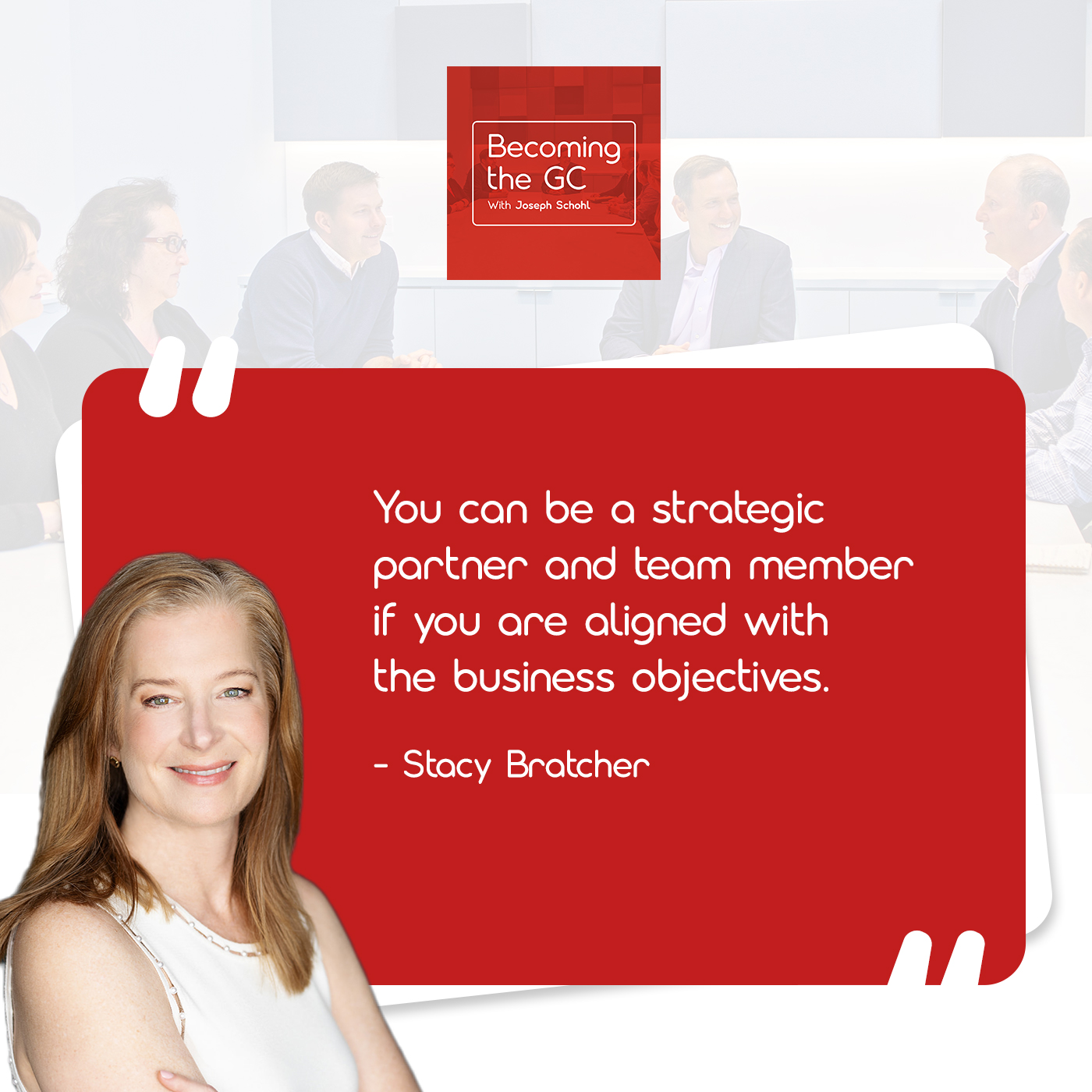
That’s core to the job, but the way you are a strategic partner and a team member is if you’re aligned on the business objectives. I’m at a nonprofit, so making money isn’t why we’re here, but if you’re aligned on why your business is there and you have a role in supporting that, it’s key. I do a C-suite series on the legal department. I interviewed Evan Wong, who’s the CEO of Checkbox.ai. He said the same thing.
Identify the best next steps to take by constantly following up and creating a feedback loop. Share on XHe said, “I need a general counsel who is focused on my business goals.” It’s not so much techniques as much as it is aligning your mindset around that. If you have the right mindset and somebody brings you a question, if you’re thinking about how can I help the company make money or how can I help them with the business objective? You have that risk management in your mind too, but it’s not what you’re leading with.
I would say that when you do that, you’re in a better position to do the protective role of the GC and the organization because you’re included in conversations. You’re trusted as a partner and an ally. Not just there to please your colleagues. What haven’t I covered that you think is one of your secret sauces that you would share with the readers about how to be successful in an in-house role?
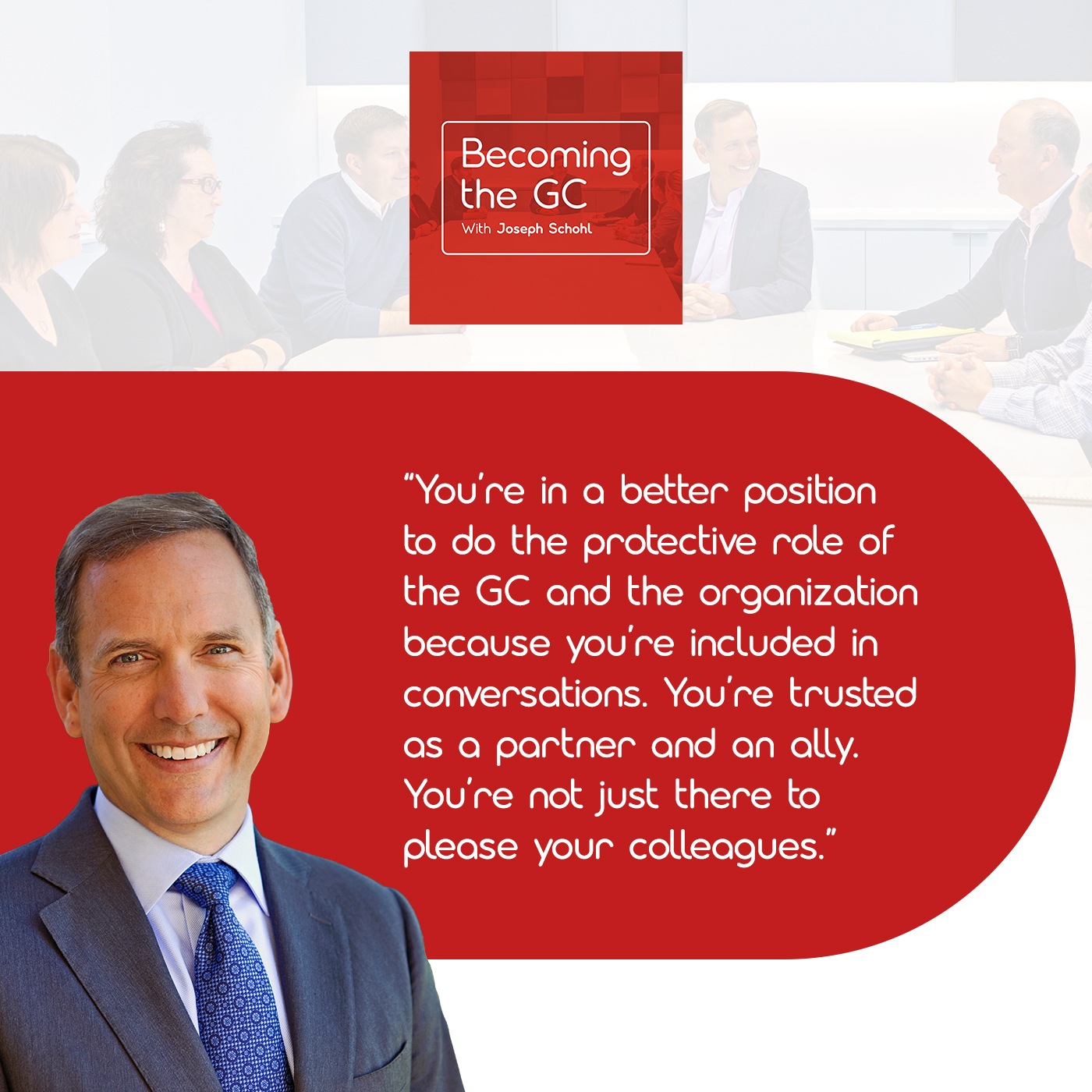
The Secret To Success: Competence And Kindness
I interviewed Scott Becker, the founder of Becker’s Healthcare on the show in 2024. He said, “The keys to being successful are to be competent and nice, like to be easy to work with.” I would give folks that advice. Maybe it goes back to what we were talking about me being an accountability driver at USC. Being somebody who is approachable, and not leading with judgment.
The keys to being successful are to be competent, nice, and easy to work with. Share on XWhen I was in a law firm, I thought, “Why can’t these clients do X, Y, and Z?” You’d always say like, “How did they get in this situation in the first place?” Putting that holier than now or that judgment hat to the side and being there to be an open door and a friendly ear for people is good advice. it’s Scott Becker’s competent and kind.
What about advice to your younger self?
That is a tough one. That’s a stumper. I republished this episode, I was on an episode of the Personal Jurisdiction show, which is a show that’s focused on the younger folks in their career. I would not have borrowed so much money out of law school. That’s one of my key takeaways.
Amen to that. If you weren’t a lawyer, what do you think you’d be doing?
Back if I hadn’t borrowed a bunch of money, I think that at a certain level of government. I would have enjoyed being in a public policy role in government relations. I do that now as part of my GC role, but I came out of state government in a policy role and I enjoyed that. I don’t know how I feel about this, but when I was in between college and law school, I was interested in doing public relations. After having done a lot of crisis communications, I don’t know that I’d want to do that, but that was another potential interest. I feel like this is a good fit for me, so I’m going to stay the course.
I always joke in the economy, the post-apocalyptic world, I’d be in a little bit of trouble.
What would you be trading?
I don’t know. Does anybody need legal advice?
I think these days, always.
What are you looking forward to?
I’ve been thinking. I’m still in the meat of heavy career days, but I do in the future want more of a portfolio career. Back to my mornings where I’ve got my head down in reading and doing some reflecting, I’d love an opportunity to do more reading and writing in whatever form that takes. I sit on the board of a couple of nonprofits. I enjoy that. I would love to parlay that board experience into a paid corporate board seat and some investing. I’ve gotten involved with a couple of opportunities to do some angel investing and I’ve enjoyed that.
What do you do with your free time?
Do you mean like parenting? I do parenting. I work out. We live in lovely Santa Barbara, so we spend a lot of time outside, but not a ton of free time.
Do you podcast?
I took that on. I thought here, “Let me fill these morning hours with some more legal-inspired work.”
It’s been great having you on the show, Stacy. I appreciate it.
Thanks for having me.
I think our readers will benefit from this conversation. Thank you.
—
Thank you for reading. I hope you enjoyed our time with Stacy. I know I did. A few key things I’ll take from this episode are how Stacy demonstrated leadership even before she was in a formal leadership role by stepping into the void that often exists at the end of meetings and being the one to take the lead with the group in determining next steps and then following up after the meeting to help move things to completion.
I also loved the advice she passed along from one of her podcast guests who said, “A great path to success is to be both competent and nice.” Being approachable, being an ally to your business partners is key if you want to be a sought after advisor and eventually, if you’re not careful, will get you into that GC role. Until next time. For more tips on accelerating your path to becoming a world-class general counsel, visit InsideCounselAcademy.com and connect with me directly on LinkedIn.
Important Links
- Stacy Rummel Bratcher on LinkedIn
- Inside Counsel Academy
- General Counsel West
- Cottage Health
- The Legal Department Podcast
- Tenet Healthcare Corporation
- Ready Set GC
- Checkbox
- Becker’s Hospital Review
- Inside Counsel Academy
- Joseph Schohl on LinkedIn
About Stacy Rummel Bratcher
 Stacy Bratcher
Stacy Bratcher
SVP and Chief Legal Officer
Board Member
Stacy Bratcher is a consumer-focused healthcare business strategist and attorney with expertise in governance, risk management and health care regulation. She has been advising boards of multi-billion-dollar organizations for two decades.
She served for 15 years at the University of Southern California, a top 20 private research institution, rising to Managing General Counsel of the university and Corporate Secretary of Keck Medicine of USC. Recruited for her healthcare law expertise as the university was forming its medical enterprise, she helped navigate the organization from inception to its #16 ranking on the Honor Roll of U.S. News and World Report.
Appointed by two County Supervisors, she served for 14 years as a Commissioner for the Los Angeles County Hospitals and Health Care Delivery Commission to oversee healthcare for the most populous county in the United States.
She has also spearheaded legal response to crisis matters, including several federal investigations, #metoo lawsuits and class action litigation, coordinating incident response with public relations, insurance carriers, rating agencies and the board.
Currently, she is Senior Vice President and Chief Legal Officer of Cottage Health, a $1B health system in Santa Barbara and a Trustee of an $800M workers compensation insolvency fund for major employers in California, including Fortune 50 companies.
She is a frequent writer and speaker on healthcare and governance topics, with publications in STAT News and the American Health Law Association. She is the creator and host of The Legal Department, a professional development podcast for lawyers.
Stacy holds a juris doctorate and certificate in Health Law, from St. Louis University School of Law and a BA from Truman State University; and a certificate information privacy from the International Association of Privacy Professionals.
